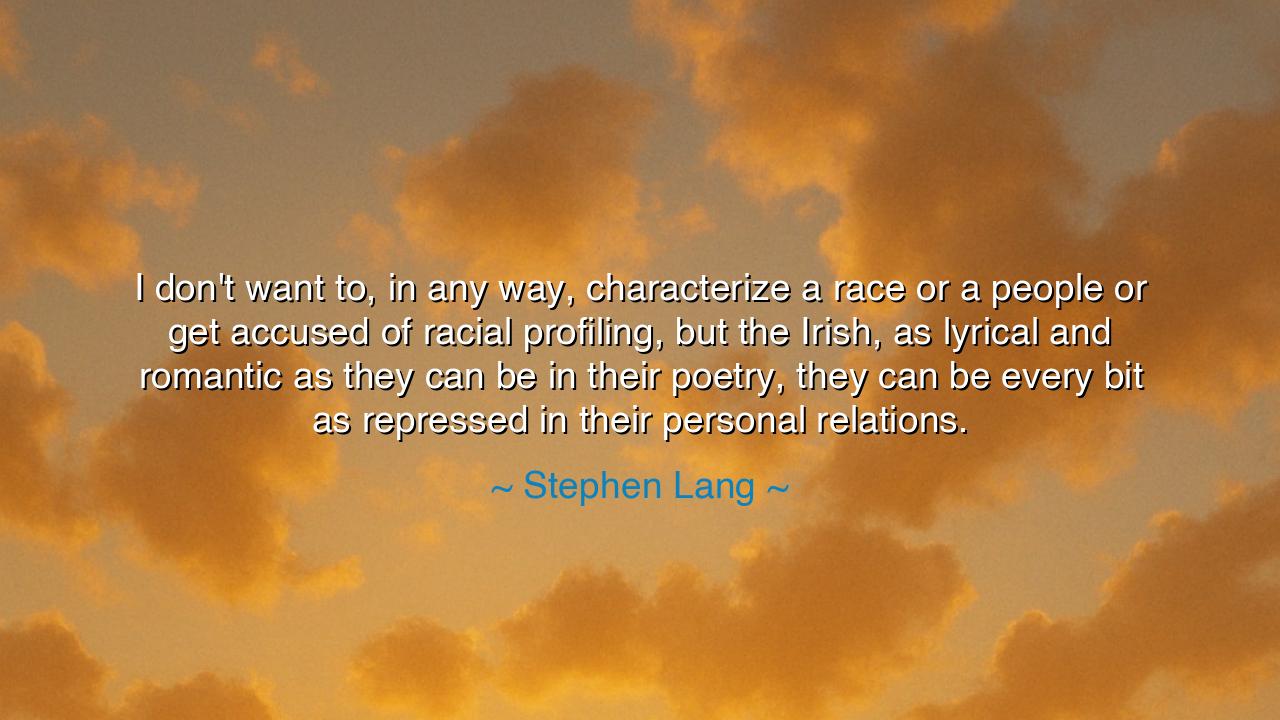
I don't want to, in any way, characterize a race or a people or
I don't want to, in any way, characterize a race or a people or get accused of racial profiling, but the Irish, as lyrical and romantic as they can be in their poetry, they can be every bit as repressed in their personal relations.






The words of Stephen Lang—“I don’t want to, in any way, characterize a race or a people or get accused of racial profiling, but the Irish, as lyrical and romantic as they can be in their poetry, they can be every bit as repressed in their personal relations.”—are spoken with care, yet they strike at a timeless paradox of human nature. He acknowledges the duality of the Irish spirit: one that gives the world verses steeped in longing, music rich with sorrow and joy, and tales woven with tenderness, yet often hides its deepest emotions in silence, veiled by restraint. This tension between lyrical expression and personal repression is not only Irish, but universal, a condition found wherever the heart struggles between the need to speak and the fear of vulnerability.
When Lang describes the Irish as lyrical and romantic, he points to their ancient tradition of poetry and song. For centuries, bards and storytellers have poured forth the passions of the people: the beauty of the hills, the pain of exile, the hope of freedom, and the ache of love. Irish literature, from the verses of W.B. Yeats to the laments of anonymous folk songs, breathes with romantic intensity. The nation has long been a fountain of words that seem to come not from the tongue alone, but from the very marrow of the soul.
Yet, in the same breath, he speaks of repression—a withholding in personal relations, a tendency to bury what is most tender beneath stoicism or restraint. Here lies the great paradox: a people who can sing of love with unrivaled beauty may struggle to speak it plainly in daily life. This duality has roots in history. Centuries of oppression, famine, and hardship hardened the Irish spirit, teaching them that survival often meant silence, and that vulnerability was a luxury that life did not always permit. Out of this silence came art—intensely beautiful, but sometimes divorced from the raw intimacy of ordinary speech.
One can see a mirror of this paradox in the life of James Joyce, whose work Ulysses and Dubliners captured with piercing brilliance the inner lives of ordinary people. Joyce exposed both the lyrical and the repressed, the grandeur of imagination alongside the quiet paralysis of daily existence. His genius lay in revealing that the soaring poetry of the Irish mind coexisted with the reticence of the Irish heart. He gave voice to what many felt but could not express, embodying the very truth that Lang names.
The meaning of this observation reaches beyond Ireland. Many of us live such contradictions—outwardly eloquent, inwardly silent; bold in art or dream, hesitant in personal truth. The soul yearns to speak with lyricism, but fear, pride, or habit hold us back. Thus, the wisdom in Lang’s words is not to judge, but to remind us that eloquence in one sphere must not excuse repression in another. The great challenge of humanity is to unite the poetry of expression with the courage of intimacy.
The lesson for future generations is to learn to bring the beauty of art into the honesty of daily life. Do not let your deepest tendernesses be confined to poetry, song, or imagination. Speak them aloud to those you love. Let your words of affection, gratitude, and sorrow be heard not only in the halls of literature, but in the quiet rooms of your own life. For what good is a lyric that enchants strangers if silence estranges those closest to you?
Practically, this means daring to tell your beloved what they mean to you, to thank your parents, to speak kindness where it is felt, and to break the chains of repression with the simple, vulnerable act of truth. Write poetry if you must, but do not let your poetry substitute for presence. Let the eloquence of the heart flow as freely in your kitchen and in your friendships as it does upon the stage or page.
Thus, Lang’s words, though born of reflection on the Irish, echo as a universal teaching. To be romantic and lyrical is a gift; to overcome repression and bring that lyricism into real human connection is a calling. May we learn from this paradox, and may each of us strive to live as both poet and companion—singing beautifully, yes, but also speaking bravely, so that those dearest to us may feel the fullness of the love we carry within.






AAdministratorAdministrator
Welcome, honored guests. Please leave a comment, we will respond soon